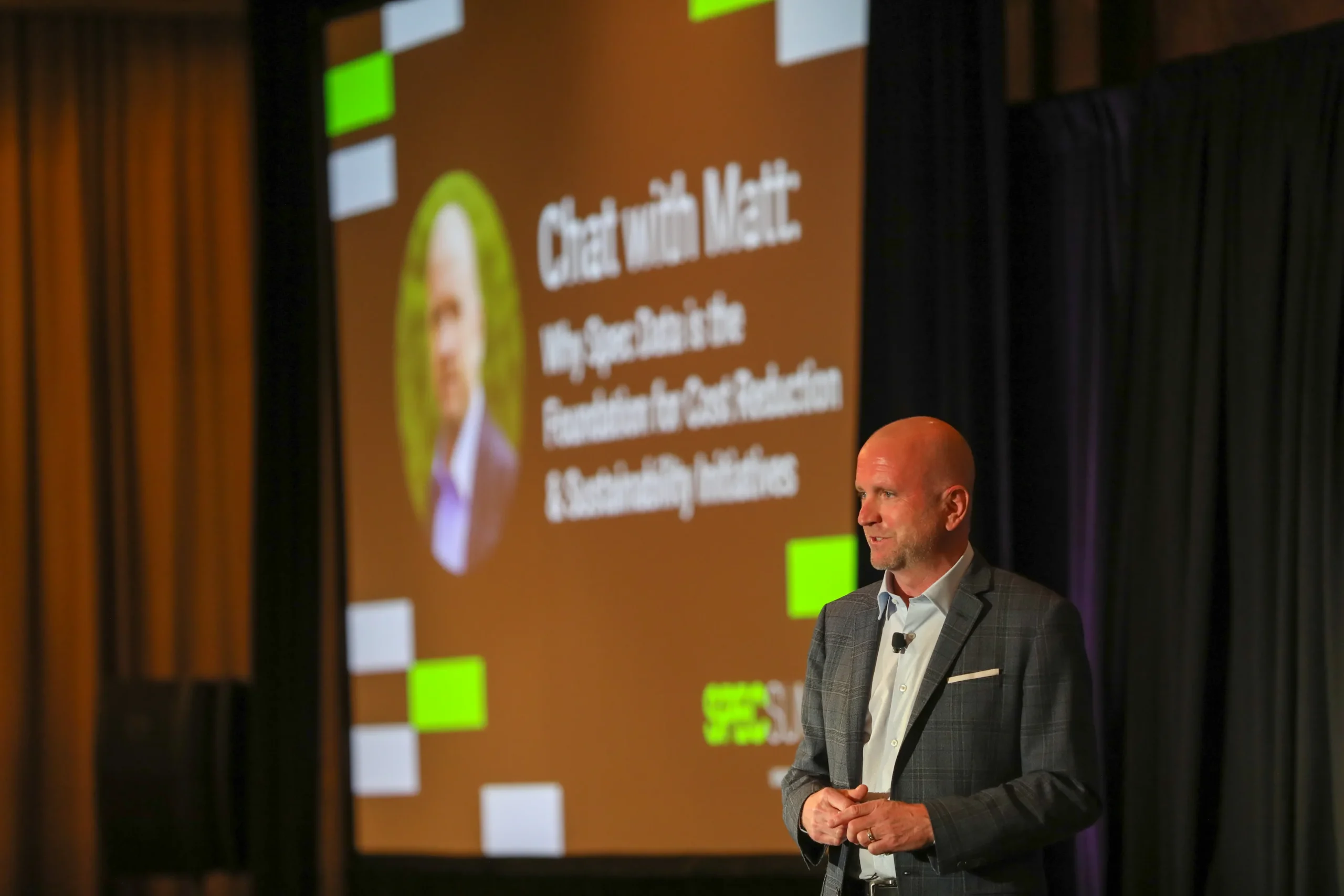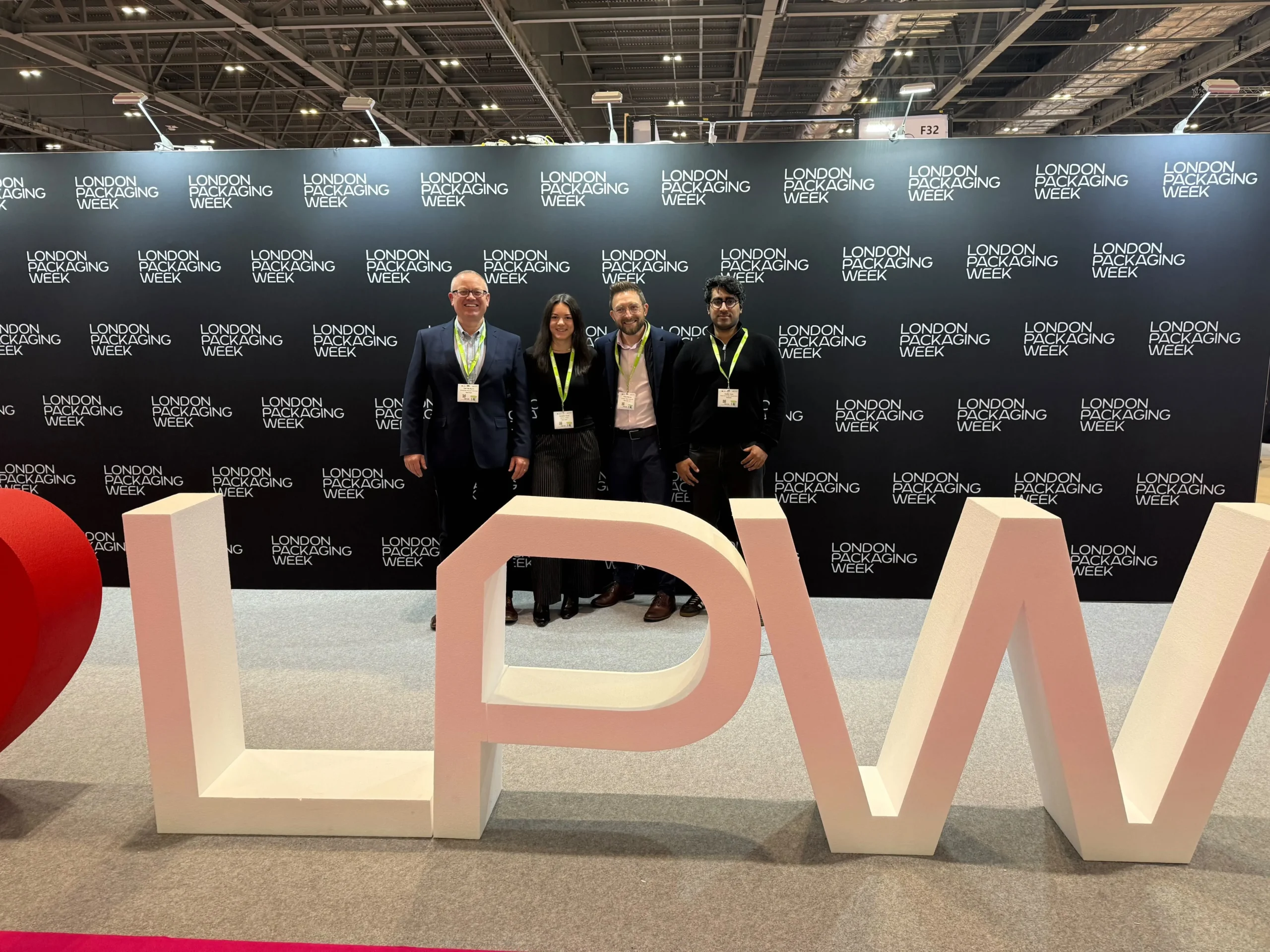The Specright team is reeling with excitement after three days of insightful conversations at our annual Specification Management Summit in Austin, TX. With speakers from leading fortune 500 companies, Gartner, academia, and more, attendees were able to learn and engage with leaders who are pushing their respective industries forward.
Below are some of the highlights and key themes from this week’s sessions.
Chat with Matt
Day 1 of Summit began with an introduction from Nick Malewicki, General Manager of the Autonomous Division at Big Joe Forklifts, followed by a keynote from our CEO Matthew Wright. Matthew explained why specification data is the foundation for cost reduction and sustainability initiatives – two topics that made up the fabric of many of the following presentations and discussions that took place during the Summit. Today, it’s no longer just about cost, sustainability needs to be taken into consideration too, and that doesn’t necessarily mean higher costs. Matthew also mentioned extended producer responsibility (EPR), which will levy fines on companies for the amount of packaging they contribute to the waste stream. Matthew concluded that in addition to more innovation on the materials and machinery side of the business, the application of software and technology to packaging will continue to unlock new opportunities for companies.
Chair Introduction and an In-Depth Look at Central Garden and Pet
We were extremely excited to have change maker and maverick Paul Gray, Director of Continuous Improvement at Central Garden and Pet, as this year’s Summit chair. To kick off day 2, Paul started the opening presentation with an overview of his company’s journey with Specright, from quality and procurement to supplier collaboration and beyond. He touched on how the company was facing some big challenges, including working with legacy systems and a lack of overall data confidence, and how his company turned to Specright to help. Attendees left with a first-hand look at how a market leader in garden and pet supplies was able to avoid duplicate work, boost productivity, and increase visibility and reporting by taking a spec-first approach.
2024 Buzzwords: Sustainability and Data
Sustainability is easily one of the most pressing business priorities today. Companies have strong goals and must track and report on sustainability targets and back up those claims with data. Consumers are also actively educating themselves before making purchases and regulators are emphasizing sustainability as part of their legislative agenda.
Many of the sessions from this year’s Summit touched on sustainability and data, including our CEO Matthew Wright’s presentation around how consumers are demanding more from companies in general, especially when it comes to sustainability. Matthew spoke about the recent U.S. consumer survey launched by Specright late last year, where results revealed that 80% of consumers are more likely to trust companies that back up their sustainability claims with publicly shared data. The survey also revealed that 69% don’t believe companies are accurately and honestly reporting on sustainability goals today. Matthew explained how the results emphasize the importance of data and how it can influence a consumer’s decision to purchase products, but many organizations today lack the data to back up their claims or even correctly track and report on sustainability goals, which can negatively impact business. This year, it’s imperative that companies organize and digitize critical product and packaging data to make reporting on sustainability as accurate as possible and even spark more sustainable product innovation.
One of the most anticipated and timely sessions was our CIO panel with retired CIO and current Specright Board Member, Mike Crowe, Colgate-Palmolive CIO, David Foster, Global Head of IT at Maesa, Andrew Scozzafava, and HAVI CIO, Padmini Mandavalli. The panel discussed feedback and tips on successfully partnering with IT leads on data management strategy and how to get the right buy in and alignment with teams. Their advice centered on changing mindsets to be enablers and problem solvers with an understanding that different organizations are at varying levels of maturity with their use of technology in operations. The panel highlighted it’s important to bring tech partners in early and pick someone that is willing to truly be a partner.
Other sustainability and data presentations included a panel on navigating sustainability while driving innovation which was moderated by the host of the Sustainable Packaging Podcast, Cory Connors, and included Director of Packaging Engineering at Dermalogica, Kevin Davis, Senior Manager at Taylor Farms, Kitty Dowgert, and Amcor Endowed Chair in Packaging Sustainability at Michigan State University (MSU), Rafael Auras. The panel noted the importance of defining sustainability for your organization and the importance of setting a baseline. John Blake, Senior Research Director at Gartner, presented on why a company’s product and packaging strategy also needs a data strategy.
Coming Soon: Specright Network and New Features/Functionalities
Many companies are spending too much time chasing data and not innovating, impacting the overall state of supply chain collaboration. Specright’s CTO, Ayman Shoukry, and Specright Network Manager, Danielle Goad, provided Summit attendees with an exclusive first look at Specright Network, an upcoming platform that will allow organizations to seamlessly share data across brands and suppliers. The session featured insights from two current beta users – Summit Chair and Director of Continuous Improvement at Central Garden and Pet, Paul Gray, and Development Leader for R&D Packaging at Hormel Foods, Brock Miller.
The Specright team also showcased various new features and functionalities, including:
- Export spec to PDF
- YoY sustainability reporting
- FDA supplier recalls/inspection
- Export to NPD
- COMPASS enhancements
The Importance of Change Management
In a captivating closing keynote, Gary Grates, President of Grates Consulting Group, discussed the methods of effective, sustainable business transformation and employee behavior. He started his session with an eye-opening stat that organizational change fails 70% of the time for global companies. Why? According to Gary, it’s because organizations keep repeating what they’ve done a million times before and expect to see a different result. He argued that change is a way of thinking, not a process, and that companies need strong internal communication for change to be successful. He left attendees with the advice to adopt a new mindset, which includes:
- Changing the conversation internally
- Making change inclusive
- Engage leaders and managers as others will follow
- Establish a goal line and have milestones
- Make change important (not just an announcement or a slogan on a mug)
It’s hard to believe another Summit has come and gone, but we had such a wonderful time reconnecting with repeat attendees and customers and meeting some new faces this year. We know the key takeaways from the presentations, panels, breakout sessions and one on one conversations will influence the work done in 2024.
In case you missed it, we’re already planning for next year’s event, taking place in Nashville, TN, from Feb. 5-7, 2025. We hope to see you there!
Explore More Blogs
Get Started
With Specright’s Solution Suite, you can digitize, centralize, and link your specification data to drive efficiencies, intelligence, traceability, and collaboration within your organization and across your supply chain network.




